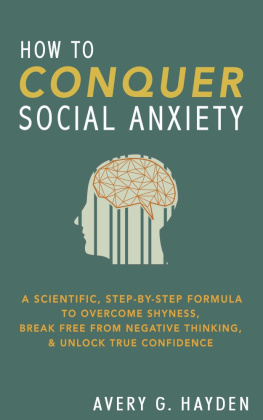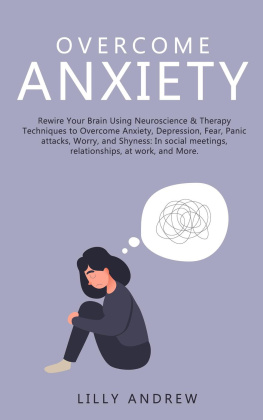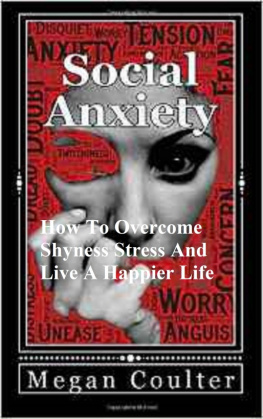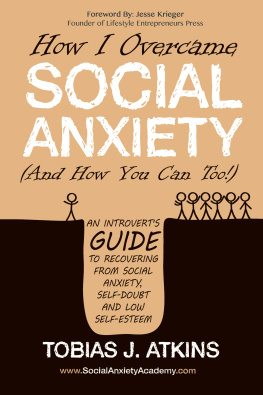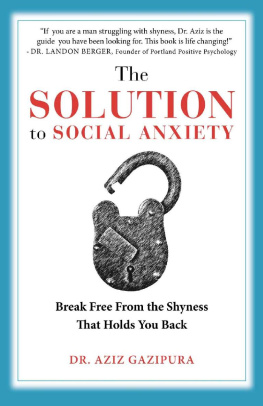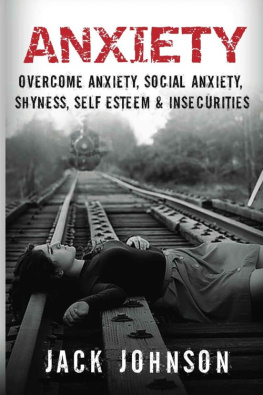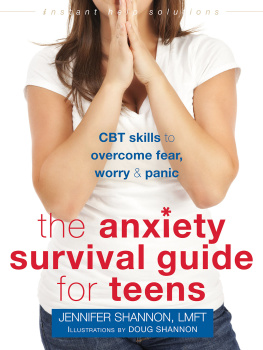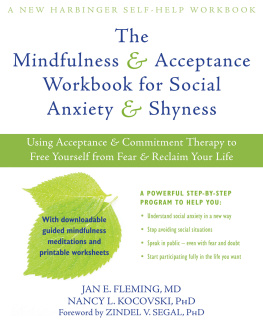Conquering Social Anxiety
A Scientific, Step-by-step Formula to Overcome Shyness, Break Free from Negative Thinking, and Unlock True Confidence
Table of Contents:
Chapter 1: What is Social Anxiety?
Chapter 2: Take Responsibility
Chapter 3: The Three Models
Chapter 4: Internet Use and Social Anxiety
Chapter 5: Anxiety Serves a Purpose
Chapter 6: Challenge One- A Day Without Screens
Chapter 7: Challenge Two- Lets Go to the Mall!
Chapter 8: Challenge Three- Eye Contact
Chapter 9: Challenge Four- Busy Sidewalk
Chapter 10: Challenge Five: Ask Strangers for Directions
Chapter 11: Challenge Six- Make Small Talk with Strangers
Chapter 12: Challenge Seven: Dance in Public
Chapter 13: Challenge Eight: Rejection Training
Chapter 14: Challenge Nine: Tell Someone How You Feel
Chapter 15: Vigilance
A quick note:
If you leave an honest review for this book before April 20 2017, I will send you a free copy of the upcoming video product version of this book (normally $97) upon its release (July 2017).
The video product will include hidden camera demonstrations of all the challenges contained within this book.
If you want to take advantage of this temporary offer, simply send an email to me at letting me know you left a review (you dont have to prove you left a review, and you dont need to tell me how you reviewed it). I will then send you a copy of the video product when it is released.
What is Social Anxiety?
About fifteen million Americans have social anxiety today. According to the Anxiety and Depression Association of America, Social anxiety is the fear of being judged and evaluated negatively by other people, leading to feelings of inadequacy, inferiority, embarrassment, humiliation, and depression. Notice that the definition says social anxiety leads to feelings embarrassment and humiliation, its ironic if you think about it. When we experience social anxiety, we are afraid of getting embarrassed, but in reality, most of the embarrassment we feel is from our social anxiety In fact, people with social anxiety are unlikely to experience many embarrassing moments, because they are intelligent, empathetic and socially aware people, and so they learn to filter out saying or doing things that carry any risk of actual social humiliation.
The humiliation caused by social anxiety, is humiliation that isnt based on real feedback, but purely on negative thoughts and emotions, this is far worse than the actual humiliation experienced from giving a bad presentation or being rejected for a date.
How do I know this? Ive experienced both social anxiety and real humiliation (many times), and even though Ive been rejected by many women and Ive given some extremely awkward class presentations (I once literally said I was having technical difficulties during a class debate, and planted my head face down on my desk so I wouldnt have to keep talking), the real pain Ive experienced isnt from embarrassing moments like that, the real pain was from the risks I didnt take, from the constant discomfort of social anxiety.
Yeah, in the moment, being rejected hurt, and being laughed at by my classmates for a bad presentation felt humiliating, but the next day, it was funny, I could turn it into a joke. But the constant self-monitoring, the ever-present fear of saying the wrong thing, the endless negative imagined scenarios of humiliation that I would run through my head, those were never funny. They were a constant source of stress, if I didnt have social anxiety I would have gone on a date before the age of nineteen; if I didnt have social anxiety, I would have enjoyed social gatherings instead of constantly worrying about doing the wrong thing; if I didnt have social anxiety, my memories of high-school and college would have been memories of self-expression and human connection, not memories of sinking quietly into a pit of self-created despair.
Take Responsibility
What I didnt know until I had experienced several years of crippling social anxiety, was that it is something that can be overcome. We are taught that psychological disorders, like anxiety and depression are created by imbalanced brain chemistry. Yet, modern research doesnt back up this claim.
Scientists came to the conclusion that psychological disorders result from imbalanced brain chemistry because people with depression showed lower levels of the neurochemical in their bloodstream than people without depression. This led researchers to develop antidepressants, also known as SSRIs (Selective Serotonin Reuptake Inhibitors), in laymans terms SSRIs increase the amount of Serotonin that your body uses on a day-to-day basis. Studies found that antidepressants improve depression (and anxiety), so scientists were led to the conclusion that conditions like anxiety were caused by a chemical imbalance in the brain, an imbalance that could be fixed with the right drug.
Those of us with anxiety and depression are led to feel like victims; our brain chemistry is imbalanced and were told only a pill can fix it. If the pill doesnt work, were out of luck. The idea that we are the victims of a disease that is outside of our control implies that our anxiety and depression isnt our fault, which is, in many ways, true, but it also implies that we are victim to a brain that isnt functioning correctly, and this is misleading.
As good as the logic that says depression and anxiety are caused by a chemical imbalance in the brain looks on paper, decades of more recent scientific research have led the conclusion to seem archaic, and blatantly misrepresentative of the truth.
People with psychological disorders do have changed brain chemistry. But its not a chemical imbalance in the brain that causes anxiety and depression; its anxiety and depression that cause a chemical imbalance in the brain.
Before I prove that this is, in fact, the case, I want to explain why its important. If a chemical imbalance is causing your social anxiety, then the best way to improve it is to take drugs that will change your brain chemistry. The chemical imbalance would have nothing to do with your day-to-day thoughts and behaviors, and so you would be a victim to your malfunctioning brain. This would mean its not your fault, and that its also not your responsibility to improve.
If, however, it turned out that anxiety caused a chemical imbalance in your brain, and not the other way around, the best treatment for anxiety would be not to change your brain chemistry but to change whatever is causing your anxiety. If it turned out anxiety were caused by stress, for example, you would learn methods to reduce your stress, implement them, then experience relief, and your brain chemistry would be normalized in the process. This would mean that your social anxiety IS your responsibility to improve.
I dont say this lightly, because I personally understand how painful social anxiety can be: social anxiety starts and ends with your thoughts and behaviors, both of which, you can change.
You want proof, of course:
First, when we look at when people develop anxiety and depression, it becomes clear that they dont appear out of nowhere, they develop in response to extreme stress. People who develop depression often experience a major stressful life even before their depression began (for example, the death of a friend). My anxiety reached its peak shortly after the sudden death of my father, I couldnt cope with this, so I developed anxiety, and then because I developed anxiety, my brain chemistry became imbalanced.
Second, brain chemistry can be changed by behavior. Countless studies have shown that behavior changes can change brain chemistry. In one study, a placebo medication administered to Parkinsons patients changed participants dopamine levels . In another study , Harvard psychologist, Amy Cuddy found that adopting a power pose for only 2 minutes will increase your testosterone levels (dominance hormone) by about 20% and decrease your cortisol levels by about 20%. Other studies found that when people experience a change in status, their serotonin levels change in response to this (this is because of the dominant behaviors that the person adopts when their status increases). Studies like these show that behavior changes brain chemistry, hinting that the disease hypothesis which states that: anxiety is a result of a chemical imbalance in the brain, is totally wrong. Imbalanced brain chemicals dont cause anxiety, when you have anxiety, your brain chemicals change afterwards. This implies that anxiety is caused by something entirely unrelated to brain chemistry.
Next page
